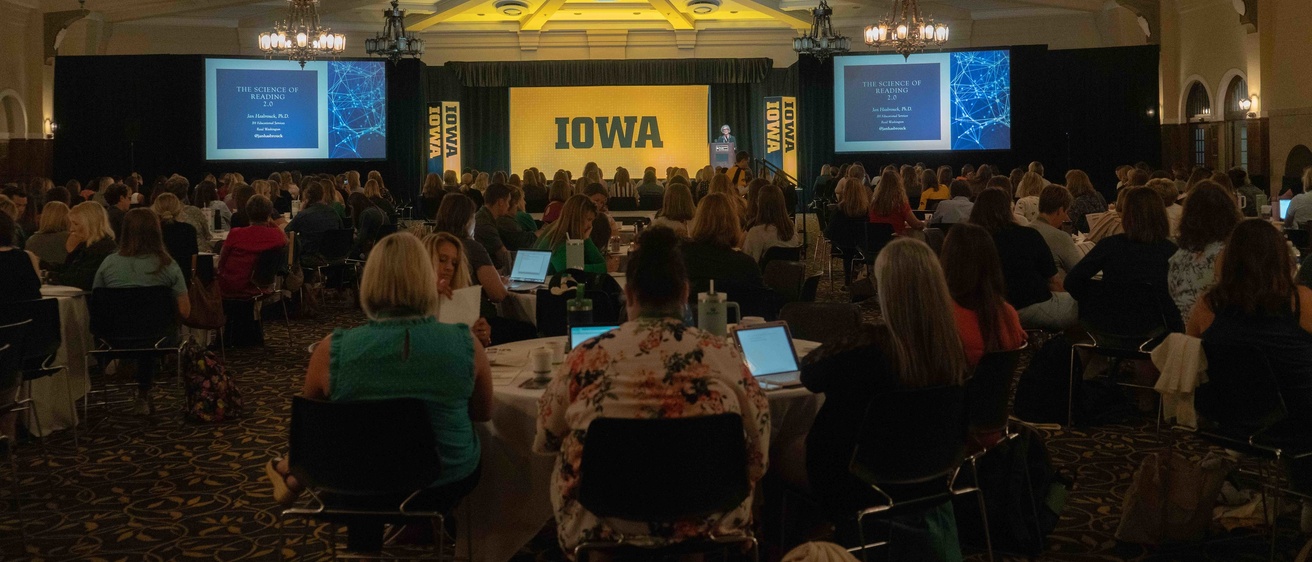Event attracts hundreds of teachers to learn about the science of reading
The Iowa Reading Research Center welcomed 300 attendees from 32 Iowa school districts, four universities, and five Area Education Agencies; all there to learn about the science of reading.
The summit at the Iowa Memorial Union on July 20-21 was the first-of-its-kind in the state.
“Hosting the Science of Reading Summit in Iowa was a big step in the ongoing initiative to educate Iowans about what the science of reading, and evidence-based instruction looks like, and how it can be implemented in classrooms and across districts,” says Nina Lorimor-Easley, the assistant director for education and outreach at the IRRC.
The science of reading movement is founded on research in decoding and language comprehension. It suggests teachers use explicit and systematic instruction of phonics to teach reading, as opposed to whole word instruction.
The IRRC is part of the UI College of Education. The center operates in collaboration with the Iowa Department of Education.

Marcie Jedlicka is an elementary reading school specialist at Tipton Community School District and a UI College of Education alumna who attended the conference. She first heard about the science of reading from fellow education colleagues four years ago.
“I always have felt like kids needed explicit instruction,” Jedlicka says. “So the fact that the science of reading aligned with that, it made total sense to me. I always believed in kids knowing and being exposed to the different rules.”
Jedlicka works with English language learners in her district, and she says the phonetic approach is a helpful way for kids to understand English as a second language.
“It definitely helps when I'm working with them, and then being able to parallel some of their language, the sounds they come with, to our sounds,” she says.
The conference included keynote addresses from reading specialist and literary coach Jan Hasbrouck and creator of The Reading Science Academy Stephanie Stollar.
Jedlicka says she was excited that the IRRC hosted the conference because she wants more educators to know about the science of reading.
Lorimor-Easley says there was strong interest in the summit.
“Many educators in Iowa have never had the opportunity to really dig deep and build an understanding of the science of reading, so this opportunity to open that door for them is fantastic,” Lorimor-Easley says. “The fact that we were able to fill this event so quickly and had such a demand and so many requests for entry after the deadline is a reassuring fact. Iowa teachers want to know what tools are out there to help their students achieve above and beyond our expectations.”
A Novel Idea podcast shares educational findings across the globe
In addition to bringing Iowa educators together to learn about the science of reading through workshops, the Iowa Reading Research Center also launched a podcast with wide listenership.
“A Novel Idea: The History of the Science of Reading” is an eight-episode documentary podcast series. It features insights from a slate of experts and original reporting to examine literacy instruction in the United States through time and how to best teach children to read.
FAST FACTS
- The podcast has been listened to in all 50 states, as well as about 60 countries and more than 2,000 cities.
- It has been downloaded more than 17,000 times.
- On Apple Podcasts, the podcast ranked as high as 96th for U.S. education charts.
Podcast host and former IRRC Communications Assistant Meg Mechelke says they learned more about how literacy connects to equity for students with disabilities, students from low-income families, Black, Indigenous, and Latinx students, and other students who have been historically marginalized by the U.S. education system.
“Teaching reading using systematic, evidence-based instructional methods in every classroom really is the only way that we can ensure that all students, regardless of background and/or identity, have the best chance of becoming proficient readers and writers,” says Mechelke.
